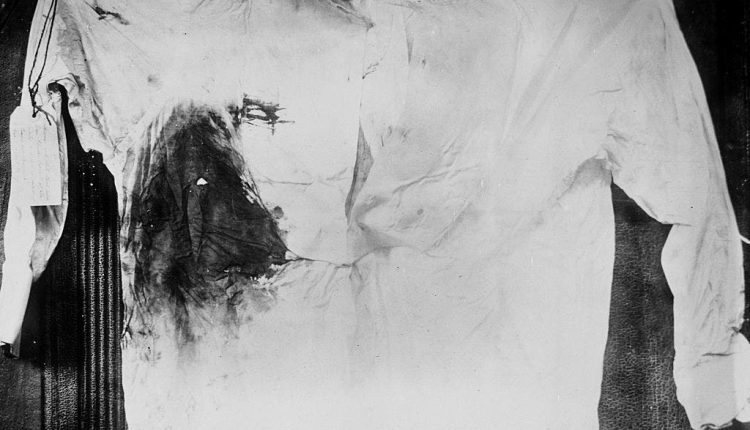On this day in history, October 14, 1912, Teddy Roosevelt shot in chest, makes campaign stop minutes later
Theodore Roosevelt, almost four years removed from the White House and running for a third term as president, survived a gunshot wound to the chest during an assassination attempt in Milwaukee on this day in history, Oct. 14, 1912.
He was shot at 8:10 p.m. — yet stoically went on to deliver an 84-minute campaign speech that night with the round from a .38 revolver lodged inside the cavity of his chest.
Blood seeped from Roosevelt’s body and soaked his white shirt with a large crimson stain as he spoke.
ON THIS DAY IN HISTORY, OCTOBER 13, 1792, CORNERSTONE OF WHITE HOUSE IS PUT DOWN
The force of the bullet aimed at his heart by New York City saloon keeper John Schrank was deadened by a metal eyeglass case — and the voluminous 50-page speech rolled up inside Roosevelt’s coat pocket.
The incident stands as one of the more sensational yet largely forgotten events in American political history.
“Theodore Roosevelt stepped out of the Hotel Gilpatrick in Milwaukee, Wisconsin, and into an open car waiting to take him to an auditorium where he would deliver a campaign speech,” Smithsonian Magazine wrote of the attack.
“As Roosevelt was settling into the back seat, a roar went up from the crowd when they saw him.”
The same source continued, “At the moment he stood to wave his hat in thanks, a man four or five feet away fired a Colt .38 revolver at Roosevelt’s chest.”
“I’m fit as a bull moose,” Roosevelt told reporters following the effort to kill him.
The contents of his pocket slowed the bullet enough to render it less than lethal.
Roosevelt had lost the Republican nomination to President William Howard Taft during a hotly contested convention in June.
He split from the GOP and was running under the banner of the short-lived Progressive Party.
His response to the assassination attempt helped secure the faction’s famous moniker as the Bull Moose Party.
“I’m fit as a bull moose,” Roosevelt told reporters following the effort to kill him.
The event also cemented the personally rugged, politically muscular image of American masculinity that the Rough Rider cultivated throughout his public career.
NYC’S MUSEUM OF NATURAL HISTORY TO REMOVE TEDDY ROOSEVELT STATUE, OFFICIALS SAY
“After he was hit, Roosevelt tottered a bit, then fell into the seat beneath him,” wrote the Library of Congress of the assassination attempt.
“Elbert Martin, his stenographer and a former football player, immediately jumped out of the car and wrestled Schrank to the ground, stopping the man who was aiming to fire again.”
Roosevelt soon gained his feet and recognized that the assailant was delusional.
“He doesn’t know what he’s doing,” Roosevelt shouted, according to the Library of Congress’ chronicle of the event. “Don’t strike the poor creature.”
AMERICANS RECITE BIBLE’S NEW TESTAMENT IN HISTORIC EVENT: ‘THE GREAT RECITAL’
The Library of Congress account went on, “The wounded Roosevelt was able to restore order to the chaos at the scene before police arrived and took Schrank into custody.”
The would-be assassin had been orphaned as a young boy after his family immigrated from Bavaria.
Schrank claimed at his trial that former President William McKinley, who was assassinated at gunpoint in 1901, told him to kill Roosevelt. He even stalked the candidate on the campaign trail.
“In the very unlikely event of the wound being mortal I wished to die with my boots on.” — Teddy Roosevelt
Shrank was ruled insane and committed to an asylum in Wisconsin in 1914. He remained there until his death in 1943.
Roosevelt was rushed to a Milwaukee hospital after the speech, teetering during the appearance from blood loss; he was then moved to another facility in Chicago.
“Physicians monitored Roosevelt for several days and ultimately decided not to remove the bullet,” wrote the Library of Congress.
“A week after he had been shot, Roosevelt was released from the hospital and was back campaigning on October 30th.”
“The split in the GOP handed the presidency to Democrat Woodrow Wilson.”
Bull Moose Roosevelt proved more popular than Republican Taft in the general election, carrying six states and 27 percent of the vote, to two states and 23 percent for the president.
For more Lifestyle articles, visit www.foxnews.com/lifestyle
But the split in the GOP handed the presidency to Democrat Woodrow Wilson.
He garnered just 42% of the popular vote — the lowest of any president since — but easily captured the White House, winning 40 states and 435 electoral votes.
Roosevelt later said of his resolute reaction to the assassination attempt: “In the very unlikely event of the wound being mortal I wished to die with my boots on.”
Roosevelt went on to live for another six-and-a-half years after the shooting.
He passed away in Jan. 1919 at age 60.
Read the full article here

